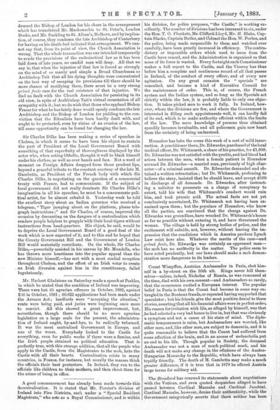Count Wimpffen, Austrian Ambassador in Paris, shot him- self in
a by-street on the 30th ult. Sings never kill them- selves—unless, indeed, Nicholas of Russia, as was rumoured at the time, died with his own consent—and Ambassadors so rarely, that the occurrence excited a European interest. The popular belief in Paris is that the Count had become in some way en- tangled in the Bontoux frauds, or repented having supported that speculator ; but his friends give the most positive denial to these stories, asserting that all his financial affairs were in perfect order. His reason for irritation with life, as alleged by himself, was that ,he had selected a very bad house to live in, but that was obviously a symptom and not a cause of his state of mind. The diplo- matic temperament is calm, but Ambassadors are worried, like other men, and, like other men, are subject to dementia, and it is quite reasonable to believe that the Count had suffered from some affection of the brain, and in an access of melancholia put an end to his life. Though popular in Society, the deceased Ambassador was not a man of much political mark, and his death will not make any change in the rogations of the Austro- Hungarian Monarchy to the Republic, which have always been tepidly friendly. The death of M. Gambetta may make a much greater difference, if it is true that in 1870 he offered Austria large terms for military aid.














































 Previous page
Previous page